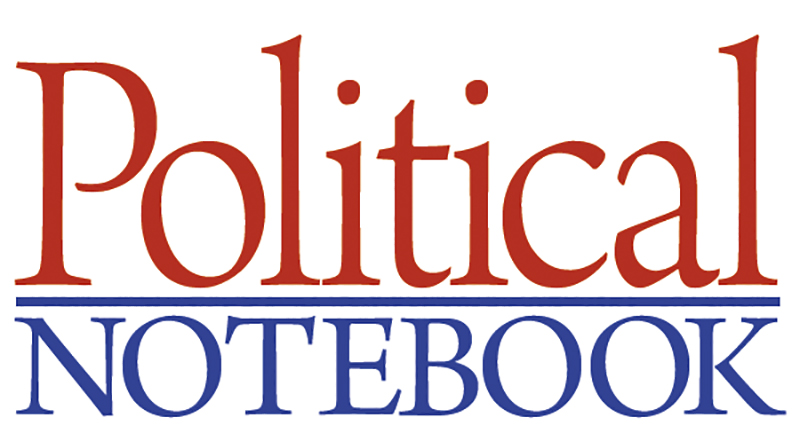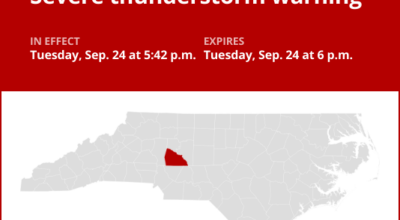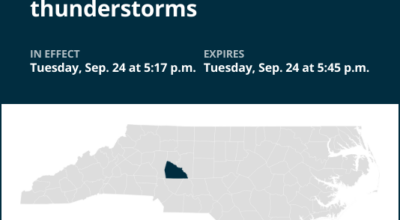Political Notebook: Cooper signs nine bills into law, including three sponsored by Rowan County’s representatives
Published 2:01 pm Tuesday, August 31, 2021
RALEIGH — Gov. Roy Cooper last week signed nine bills, including three backed by Rowan County’s lawmakers.
Among the measures Cooper signed is Rep. Harry Warren’s bill that extends sex offender premises restrictions to those convicted of sexual exploitation of a minor. The legislation is a result of Sgt. Johnny Lombard of the Rowan County Sheriff’s Office working with state leaders to fix a little-known gap in the laws governing the state’s sex offender registry. Prior to Cooper’s signature, someone convicted of making, distributing or possessing child pornography was allowed to be on school properties or other locations where children frequent.
Another Warren-sponsored bill signed into law is H.B. 273, which excludes from property taxation any increases in the value of residential real property attributed to new townhouse construction when being held for sale by a builder. The exemption would apply for up to three years and would become effective for taxes imposed for taxable years beginning on or after July 1, 2022.
Another bill signed into law comes from Rep. Julia Howard, a Republican representing parts of Rowan and Davie counties. Cooper signed H.B. 461, which makes clarifying changes to the state auditor role and the term “investigations” as well as adding political subdivisions to the list of state agencies to be monitored.
Cooper also signed H.B. 481, which allows the UNC system to sell, trade or dispose of surplus weapons. Additionally, the law provides for a 20-year waiting period to petition the court to have firearm rights restored for an out-of-state conviction.
Senate Bill 35 changes the minimum age to marry in North Carolina to 16, with a maximum four-year age difference if younger than 18 years old. Cooper said while it falls short of making 18 the minimum age, it makes the state “a safer place for children.”
Additionally, S.B. 301 allows for the expungement of up to three nonviolent felonies. Cooper said the legislation will make it easier for some who have served time for non-violent crimes and are looking to re-enter into society.
Cooper’s other signatures went to bills that make changes for in-state tuition rates for veterans to comply with federal law, authorize additional standardized tests for freshmen at private K-12 schools and make revisions to the laws governing credit for reinsurance and reserve financing.
Cooper vetoed S.B. 729, which would have made changes to the state’s residency licensure requirements for charter school teachers and make Superintendent of Public Instruction Catherine Truitt a voting member of the state’s Charter Schools Advisory Board. Doing so would have taken away an appointment from the state Board of Education. Truitt is a Republican, and Cooper is a Democrat.
“The State Board of Education is constitutionally and statutorily charged with administering children’s education in state public schools, including charter schools,” Cooper said in his veto message. “It is critical that the board have both of their appointments to the Charter School Advisory Board to carry out its constitutional duties.”
State Board of Elections launch initiative to debunk myths about election integrity
The North Carolina Board of Elections is inviting voters with questions or myths they want debunked related to election integrity to send an email for a weekly “mythbuster archive.”
Since July, the state board has posted on its website and social media various rumors or questions related to the 2020 election and accompanied them with an explanation, clarification, or “reality.”
“Misinformation can lead to confusion and damage the public’s trust in elections,” the state’s Board of Elections website says. “Through these posts, we aim to educate the public and serve as a trusted source of election information.
Questions and rumors can be submitted at misinformation@ncsbe.gov.
To date, rumors that have been debunked or clarified range from the inability for Democrats and Republicans to win a statewide election in the same year, extending voting hours, results being determined on Election Day and that no audit was conducted for the 2020 election.
One rumor states, “If election night results change in the following days, the process must be compromised, so I can’t trust the results.” The state board’s answer to that rumor is that provisional ballots and eligible absentee ballots postmarked by Election Day and received afterward are added to the results post-election in order to formally certify the election.
The state board also details on its website how each election is secured. It states North Carolina’s equipment has been certified, tested and audited in various other states and all voting systems must use paper ballots for a “paper trail.” Additionally, bipartisan and trained officials conduct elections, and additional audits following the election detect irregularities like equipment tampering, ballot stuffing and voting machine tabulation errors. Furthermore, there’s been no evidence of a successful cyberattack, and no voting machines are connected to the internet for that reason.
North Carolina is also one of a handful of states with an Investigations Divisions for reports of fraud and other irregularities during elections.
“Every voter can help promote election security by voting, checking their ballot before casting it, reporting problems with the voting process to poll workers and volunteering to work in elections,” the state board says. “Also, voters should get information on elections from trusted sources, particularly elections officials, and verify information about elections before sharing it on social media.”
For more information about spotting or reporting misinformation, visit ncsbe.gov/about-elections/election-security/combating-misinformation.
Gov. Cooper signs executive order for flexibility of certain law enforcement training classes
RALEIGH — Gov. Roy Cooper last week signed an executive order waiving rules for certain law enforcement training classes to continue during the pandemic.
Cooper said the order, No. 228, will provide flexibility and ensure continuity for both current and new law enforcement officers. The order waives rules from the North Carolina Justice Education and Training Standards Commission and the North Carolina Sheriff’s Education and Training Standards Commission that require multi-week trainings governed by the commissions in consecutive weeks.
The flexibility, Cooper says, will accommodate COVID-19 outbreaks and subsequent postponements of ongoing classes, which prevents officers from having to restart.
“This order is critical to making sure our law enforcement can continue to serve and protect our communities by receiving the training they need,” Cooper said. “North Carolina’s law enforcement has stepped up during the pandemic, and we will continue to give them the support they need to do their jobs.”
The Council of State concurred with the order.







